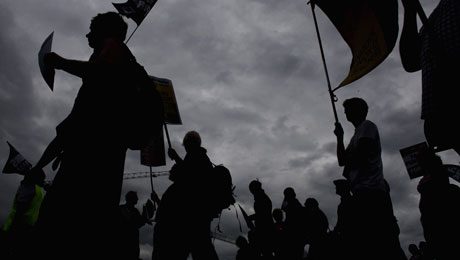A major Nigeria oil workers’ union Thursday threatened to halt production from Sunday if the government doesn’t reinstate fuel subsidies, heightening the potential for a disruption of oil shipments from Africa’s largest oil exporter.
"If there is no progress we will take it to the next level," said Lumumba Okugbawa, deputy general secretary of the white collar union, Petroleum and Natural Gas Senior Staff Association, or Pengassan.
All oil activities within the country, including production of oil and gas, delivery and exports could be stopped within three days, if a shutdown begins on Sunday, he added.
Nigeria is Africa’s largest oil exporter, supplying global markets with more than 2 million barrels a day. Already the threat of supply disruptions have helped send the price of oil futures to their highest in two months, even though output does not yet seem to have been affected.
If Pengassan carries out its threat on Sunday, this picture could very quickly change, even though analysts said it is unlikely that a lot of Nigeria’s production would be affected.
"Pengassan are threatening to shut down 700,000 barrels per day but the reality is that even a full-blooded strike wouldn’t quite reach that target," said Ashley Elliot, Africa analyst at global risk consultancy, Control Risks.
Analysts said it was very difficult to put an exact number on how much production would actually be affected if Pengassan went ahead with its strike, regardless of the union’s claims.
Automated production systems could allow skeleton crews of foreign and non-unionized workers to continue operating platforms even if flow rates have to be reduced, while oil in storage tanks could also be tapped to maintain exports at least in the short term.
Nonetheless, news that Pengassan has carried out its threat "will spook the markets," said Elliot.
Investors in oil are already concerned by deteriorating relations between Iran and the West which are threatening oil supply from that quarter, making the market particularly sensitive to any problems with exports.
Still, despite investor concerns, it remains an open-ended question whether the threatened shut down in Nigeria will actually go ahead.
"The oil worker unions tend to regularly threaten strike action and either do not follow through on the threat, or any strike that does follow tends not to last for more than a few days," said Hannah Waddilove, Sub-Saharan Africa intelligence analyst at AKE Group, a risk management company.
It is also possible the other unions will find a compromise with the government before the deadline set by Pengassan, in which case the oil union will likely back down, analysts said.
According to AFP reports, Nigerian President Goodluck Jonathan met with labor union leaders Thursday for the first time since the national strike began this week, increasing the possibility that some compromise could be reached.
But analysts question whether President Jonathan will buckle.
Although a popular measure, the fuel subsidies are also a heavy economic burden that cost the country 1.3 trillion naira a year ($7.9 billion).
For the Nigerian population the removal of the subsidy on Jan. 1 has hit hard, more than doubling prices at the pump since the beginning of the year.
"It’s a really difficult one because on the one hand, the country is being brought to a halt for sure, but it’s a question of who can outlast who," said Elizabeth Donnelly, Africa Program Manager at leading U.K. think tank Chatham House.
Source: Dow Jones & Rigzone











